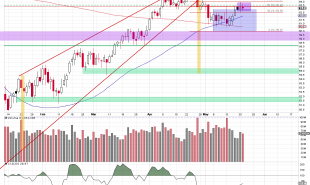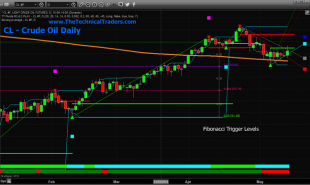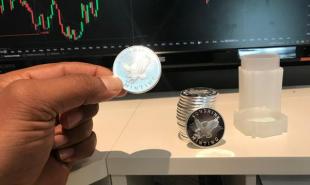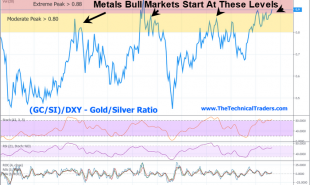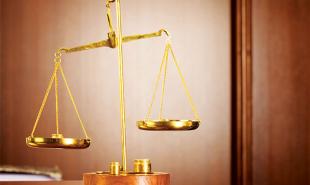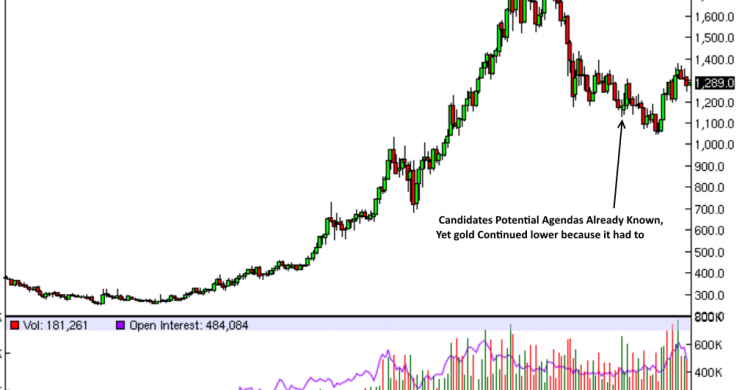
Clinton, Trump: Policy Differences and Their Effects on Gold
- inflation is a given whether Clinton or Trump win
- the difference lies in how Gold goes up, not if.
- Gold is in a Supercycle and will benefit regardless
New MarketSlant Contributor
We thoroughly enjoyed reading the following differential diagnosis on how each candidate can effect the price of Gold as a byproduct of inflation. And there is a difference. There should be something for everyone tired of the "Who's better for Gold" stories. The following explains the material differences. What was entirely new to us was this:
Gold Will go Up Regardless of Who is at the Helm. But the different policies will affect the manner in which Gold rises.
The topic of gold's potential reaction to a Trump or Clinton victory has been discussed many times here over the past months. Our own group of writers had concluded that it was irrelevant who the president was, the die was cast. A Hillary administration would be a continuation of QE like bucket kicking monetary policies. Asset prices would continue to inflate until every inviolable law of math was suspended with no real organic economic success. That in the least we'd get stagflation. A Trump presidency could bring with it more fiscal spending and building if he had his way. The former would result in a "reset" of sorts after the laws of math ring the bell. The latter, properly executed, will bring inflation as well.
Two of our favorite phrases were brought to mind from this piece. The first was the hyperbolic: "If Trump wins he will spend like a drunken sailor", which is his desire. Developers develop.
The other phrase is "Government Intervention only truly helps in the direction of the trend".
The following article elaborates in an clear and orderly manner the differences each candidate would bring to the Presidency and their effect on the price of Gold.
Submitted by Soren K
About the Author:
Alchemist is a precious metals industry professional. As his name implies, he is an expert in metallurgy. While making no claim of expertise in cycles and technical analysis, it is clear from our communication and the following post, Alchemist is very knowledgeable. He/She has worked and is working on an international project in Gold exploration. It is fair to say (the) Alchemist is not a tourist. Enjoy
Alternative: The Presidential Election and the Gold Market
[emphasis ours]. Pictures added by MS- SK
Written by Alchemist There has been much commentary in recent months concerning the upcoming presidential election and how it might affect the gold market. As almost all of it has been shallow, and lacking in substance, this subject will be addressed here in a more disciplined manner. It is apparent that many of these commentators lack understanding of the gold market in general and more specifically, may be too young to remember certain key details of past market action. I must state that, as author, I am not advocating for any candidate. So, here it is:
The primary concern lies in the economic policy advocated by the candidates. This will become clear towards the concluding remarks. To begin, we will examine the most visible aspects of the campaigns as directly advanced by the candidates.
Mr. Trump advocates "fixing" a broken economy. He wishes to spend a very large amount of money rebuilding aged and decrepit infrastructure. This is a most admirable (and necessary) objective, on the most fundamental ground possible. It will employ part of a multitude of permanently unemployed people. It will directly improve the conditions necessary for business to function within the State. So far, so good - this is direct from the Keynesian script. He will advance protectionist policy, another admirable, and necessary, goal.
Clinton II (the "correct" pronoun eludes the author) is the status quo candidate. Clinton II advocates the same policy agenda described above, in part as a direct response to the populist anger channeled by Mr. Trump. Whether it will be delivered on is doubtful. Clinton II's record is lengthy and contains nothing pointing to any such agenda; rather, it strongly suggests the opposite. Furthermore, it is also heavily bound up with the interests of the financial sector, as represented by Wall Street.
Mr. Trump, of course, has no public record and he has never held any public office. Thus, it is not possible to say much on what he might, or might not, do. One can only assume that, as a businessman, he often acted on what he said - for, had he not, he would not have been a businessman for very long.
On fiscal policy:
Mr. Trump advocates cutting a number of taxes, especially on the corporate side. He has pledged to increase the efficiency of government, but is somewhat equivocal about trying to reduce the size and scope of it. He is ardently opposed to regulations and does directly promise to drastically reduce or even eliminate many of them and the agencies responsible for them. This agenda is business friendly and would strongly aid the prospect of restoring economic growth to its former levels.
Clinton II on this front is the opposite, and here again has a lengthy record to prove it. Clinton II never met a tax she didn't like, proposes even more of them, and with respect to regulations is even worse. The resource extraction sector is specifically targeted and the candidate often boasts of stopping it entirely. Unfortunately for the candidate, the record is hers and she can't disown it. In summary, the agenda is very business negative and in some cases outright hostile.
On monetary policy:
Concerning monetary policy, the Clinton II program is fully supportive of, and in lockstep with, the program of the Federal Reserve. It should be noted that the Federal Reserve is overtly political, supports Clinton II's campaign, and has been involved in financing it on a personal level, as has been revealed by some of its members. Furthermore, Clinton II directly supports more quantitative easing programs, of which the Wall Street interests have already identified the initial minimum outlay as some five trillion dollars or so. This is the status quo at its best; an extension of the Obama years.
Mr. Trump will not engage in this sort of thing. As an outsider, he has no connection to Wall Street, which provides him with neither moral or financial support, and he was not a recipient of even a penny of the sums already created in previous rounds of QE; moreover, he has been embroiled in disputes with some of these banks during insolvency proceedings. He is outspoken and hostile to the Fed, its actions, and its leaders. He has spoken on the stock and asset bubbles and identified the Fed as responsible for them. He has casually mentioned that he likes the idea of a gold standard, and went as far as saying the national debt must be defaulted on. Flippant remarks perhaps, but pretty strong stuff.
Some remarks can be made on this topic: Clinton II is fully supportive of more QE and the sum mentioned above will be just the beginning. There will be no criticism of the Fed, and it will feel free to implement a number of the novel measures used in the more leftward socialist states, to wit NIRP, or even helicopter money. There will be no constraints on what can or cannot be done. Yet, Mr. Trump will also require a staggering sum of money to do what he wants to do and he hates the Fed already. He will need the initial sum suggested by Wall Street and then more.
To find any worthy conclusions, it is necessary to understand the social position of the two, because that is where they, if successful, will enact policies which will, in the grand political tradition, reward their respective constituencies. For it is here, in broad society, that changes in the sentiment of the gold market may be altered - to wit, the policy positions of these candidates will affect civil society itself.
On social policy:
Clinton II is a steadfast advocate of social justice. But her agenda flies in the face of this advocacy and the rank-and-file "social justice warriors" are the dependents, not the benefactors, in her movement. Thus, they can only be rewarded by policy and not financial favor. The latter favor will go direct to the financial elites, the so-called "one percent". The various dregs of society: anarchists, immature Marxists, racial strife agitators, professional rioters, and others are to be rewarded by social policy that is directed against an enemy- the working class, or more accurately what is left of it. Hence, the Clinton campaign terms the working class "deplorables"- and this characterization is something she really believes in. Imagine, a Presidential candidate actually using such a term, in the process alienating half the electorate, and further clarifying it by saying that "They are not America".
There can be no doubt on the direction of Clinton II's policies, who they will benefit- some financially, others socially- and who they will harm.
Mr. Trump is the diametrical opposite. His reason for existence lies within the ranks of the disenfranchised, insecurely and/or temporarily employed or unemployed working class, and even more so in a segment of this class which seems to have been rendered completely and permanently unemployable, for a broad variety of reasons. This class is his solid base of fervent support and if elected he will reward it. He will, if elected, seek reparations against the perpetrators responsible for past policy which hurt (seemingly by design) this class greatly. And they know it.
There exists a body of literature on this topic and this becomes too complex to treat here. This can be read in excellent detail here.
On the gold market:
Now it is possible to consider the effects of all this on the gold market, first, the implications of the candidates on monetary policy matter, and then their fiscal direction. Clinton II is the status quo - she will enrich the one percent with further rounds of QE - that is a given. Given her agenda and hatred of the working class, there will be no protectionism or infrastructure spending (recall Obama and "shovel ready").
Mr. Trump, in order to do what he says, will spend money and lots of it. He will not wish to do this by means of QE, as it is intended to go directly into the broad economy. QE is not this tool. He will have to direct the Treasury / Fed to issue debt, which he does not like to do, or resort to a novel means. This will be "helicopter money", as it was practiced in the 1950 - 1970's era to pay for various wars.
Neither can raise the funds in the existing economy. It cannot be done, as it isn't there, period.
Needless to say both policies are pure inflation, but they affect markets and the broad economy in different ways. Clinton II's QE will inflate more asset bubbles and enrich the rich in the process, which is its design goal, but it doesn't trickle down into the broad economy. It will, however, surely guarantee some future crisis (and it is highly probable that this will be by design).
Mr. Trump will then usher in inflation as it was experienced in the 1970's - there is no other possible outcome.
It is wise to consider the position of the gold market. Previous discourse on this topic tends to ignore this and that is its weakness, hence the initial observation that many of the commentators may be too young to remember certain things. The market will follow its own trend and continue do so until said trend ends. No President, and nor the Fed, can change this, but they could influence its timing and character.
The current direction is up. A supercycle magnitude wave correction ended last December. Note that the candidates and their potential agendas were already well established while the correction was concluding, and thus the market kept going down regardless- which was necessary. At the moment, a second minute correction is nearing conclusion, merely a tiny segment in the upward progress of the first primary wave.
Now consider how each potential President might affect the character of the market. Mr. Trump, should he win, is going to unleash inflation as it was experienced in the 1970s. As in the 1970s, gold was in an uptrend, and remember how it reacted then - it went up about 25x, but in an orderly fashion. Clinton II will inflate asset bubbles, which are gold neutral, potentially negative at times, while gold is in an uptrend. Until a crisis however, and that crisis will likely involve war or worse. It may even lead to interference in the rule of law- and imagine how international markets will perceive that. In an uptrend, gold may react in a chaotic manner.
While this is going on, we should enjoy the popcorn and then the profits - which could be yuuge.
- Alchemist
Read more by Soren K.Group


